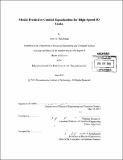Model predictive control equalization for high-speed IO links
Author(s)
Suleiman, Amr S. (Amr AbdulZahir)
DownloadFull printable version (4.801Mb)
Alternative title
MPC control equalization for high-speed input-output links
Other Contributors
Massachusetts Institute of Technology. Department of Electrical Engineering and Computer Science.
Advisor
Vladimir Stojanovic.
Terms of use
Metadata
Show full item recordAbstract
The demand for bandwidth in chip-to-chip communication has been increasing as the industry demands higher quantity and quality of information. Serial links provide a suitable architecture for this kind of transmission, because of speed, power and area limitations on parallel links. However, due to inter-symbol interference (ISI) and channel discontinuities, the data rate is being limited. Equalization schemes have been developed to cope with these problems. These equalizers compensate the loss of transmission mediums, equalize for reflections and extend the channel's maximum data rate. In this work, we formulate a new, nonlinear and time-variant, transmitter equalization method based on the Model Predictive Control (MPC) algorithm. MPC is a class of control algorithms in which the current control action is obtained by solving, perhaps approximately, an online open-loop optimal control problem. One important advantage of the MPC in peak-power constrained link environment is its ability to cope with hard constraints on controls and states. Knowing the state of the channel enables a very fine nonlinear equalization. We utilize this flexibility to create various MPC formulations that control the entire eyemask, receive signal dynamic range as well as the required quantization. Our MPC equalization significantly outperforms traditional transmitter techniques such as linear feed-forward and Tomlinson-Harashima equalizers, and gets very close to the optimized decision-feedback equalization at lower transmitter resolutions. We also describe the possible complexity reduction techniques that enable efficient implementation of our MPC algorithm in hardware.
Description
Thesis (S.M.)--Massachusetts Institute of Technology, Dept. of Electrical Engineering and Computer Science, 2013. Cataloged from PDF version of thesis. Includes bibliographical references (p. 50-53).
Date issued
2013Department
Massachusetts Institute of Technology. Department of Electrical Engineering and Computer SciencePublisher
Massachusetts Institute of Technology
Keywords
Electrical Engineering and Computer Science.